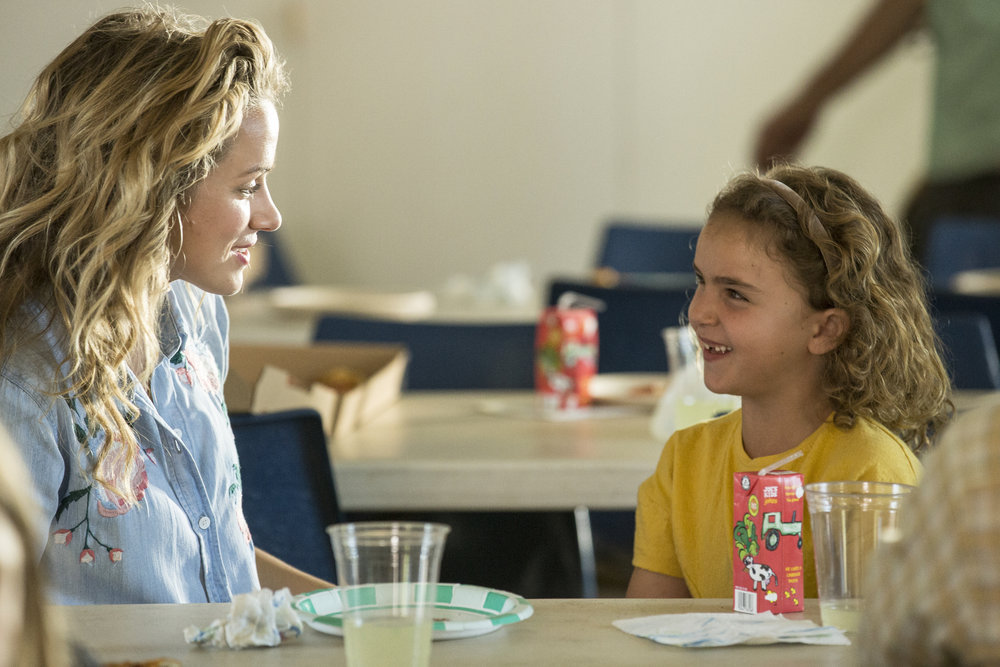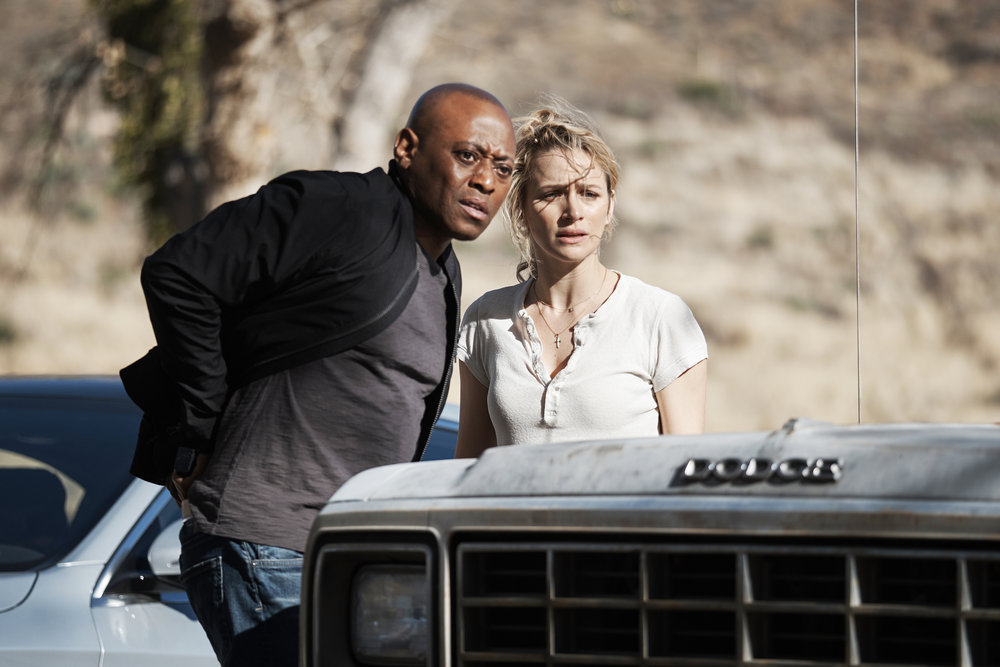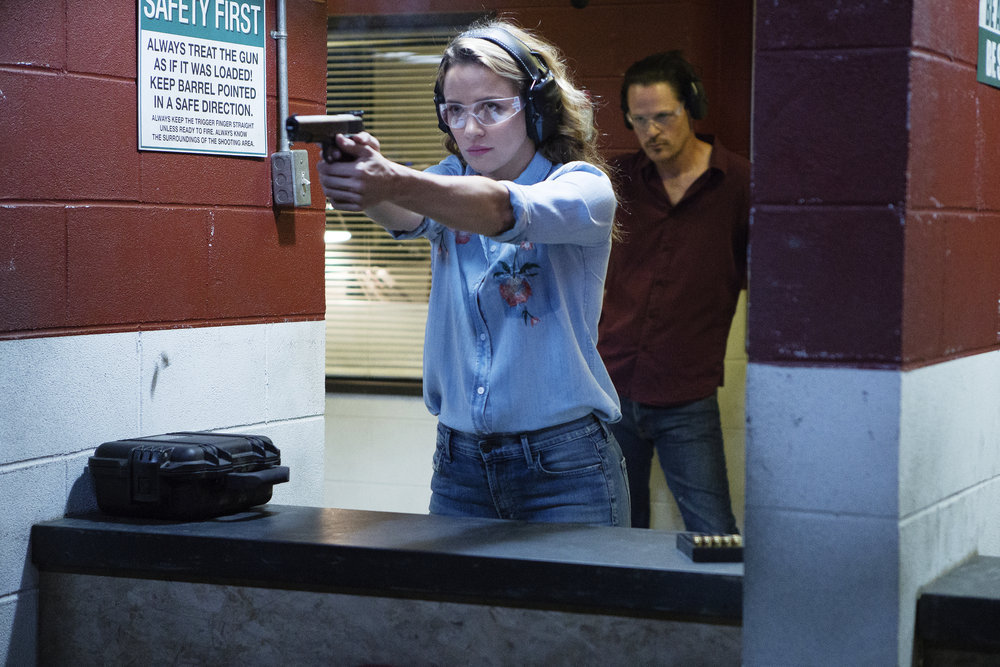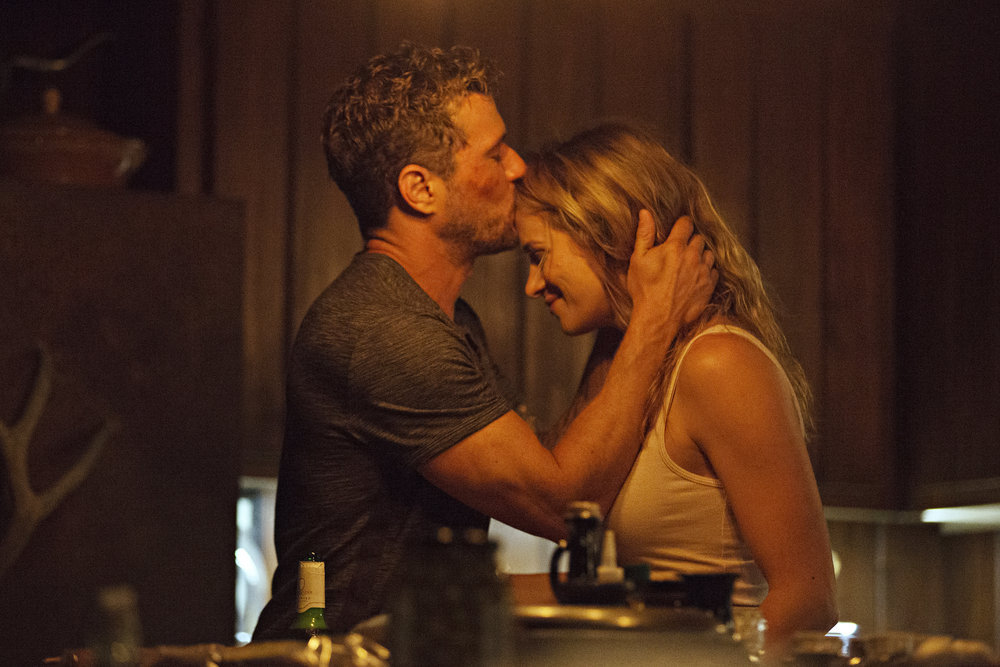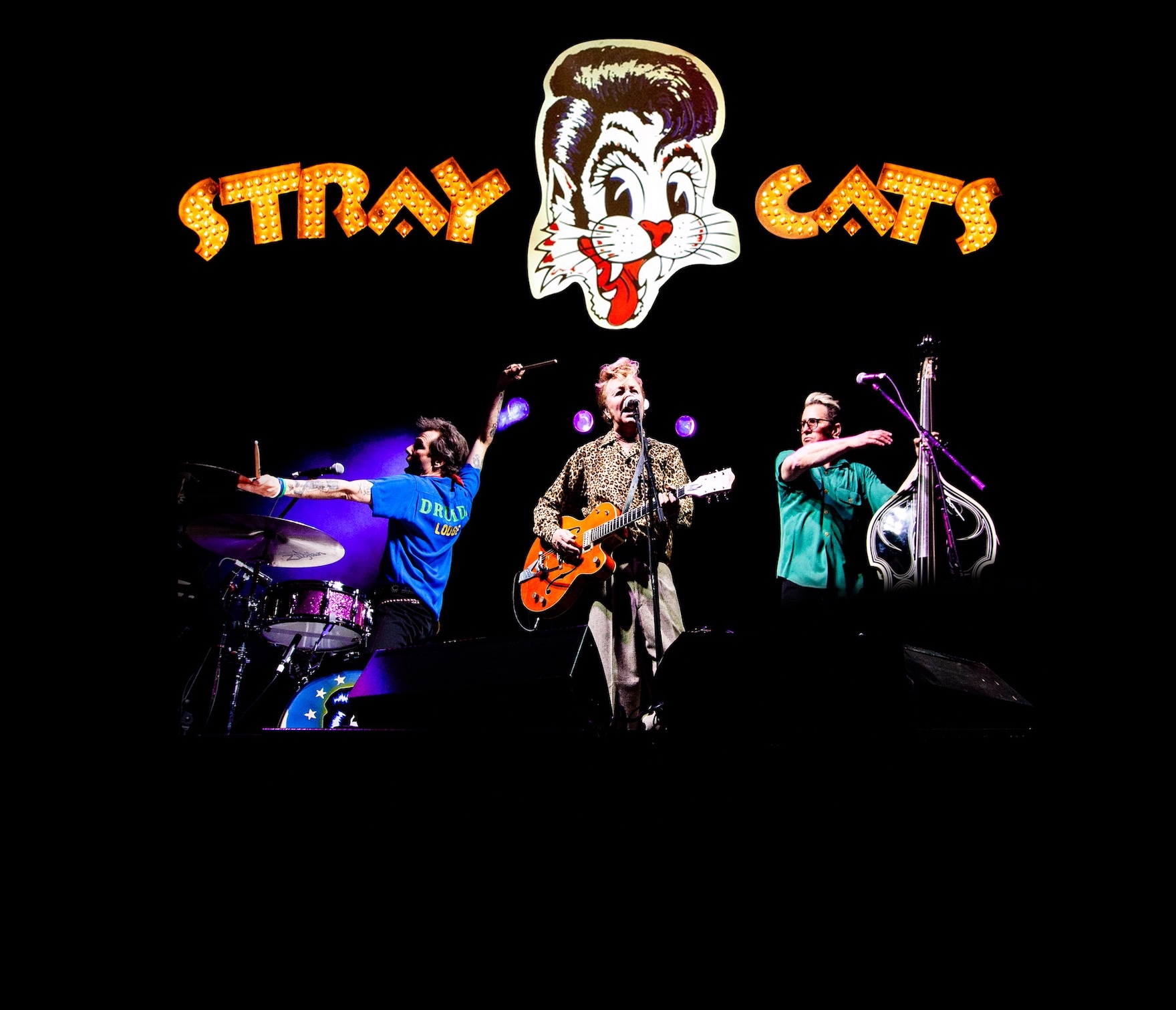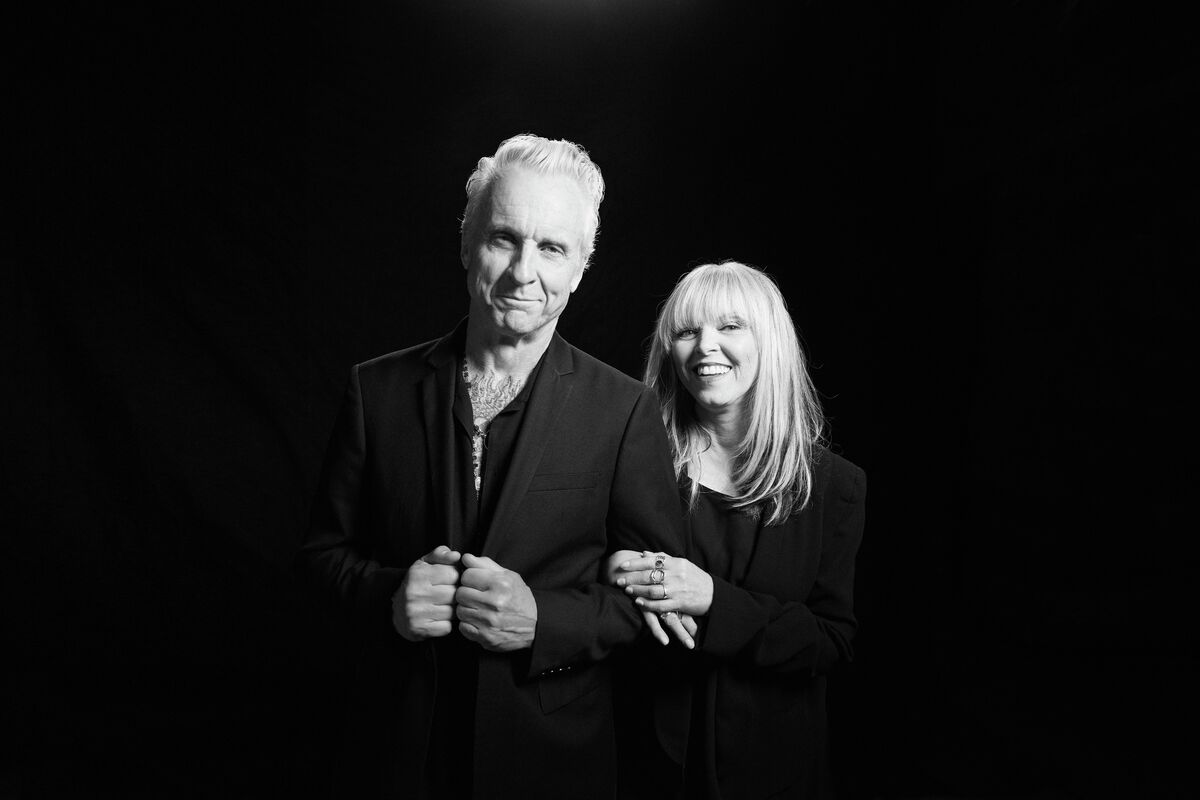Sometimes art imitates life.
Not to take anything away from the popcorn elements on "Shooter," which are a real blast, but the real reason why this series is so strong is that what we see is what we get. In other words, Bob Lee and Julie Swagger aren't that far removed from the actors giving them life. Both Ryan Phillippe and Shantel VanSanten are taking personal moments from their real lives and incorporating them into this series.
For Phillippe, who plays a marine sniper heroically trying to take down a global shadow network named Atlas (and its own sharp-shooter, Solotov), this means reportedly chasing down an all-terrain vehicle last summer before it could plow into people. In the process, he broke his leg, which cost "Shooter" its final few episodes in season two.
VanSanten's road has been more difficult. The actress has spoken out on social media about past abuses and isn't afraid to discuss her post-traumatic stress disorder in media interviews. VanSanten has channeled her pain into her work, bringing something extra to Julie's plight.
To recap: In season one, Bob Lee was accused of trying to assassinate the president, forced on the lam, and left unable to fully protect Julie and their young daughter, Mary (Lexi Kolker). The women were kidnapped, held at gunpoint on more than one occasion, and then finally free once Bob Lee was exonerated. Of course, the lack of legal repercussions didn't stop the bad guys from coming after Bob Lee, and, once again in season two, he was on the run. As his unit members were taken out one by one by Solotov, Bob Lee began gunning for his nemesis, but was ultimately shot, forced into a van, and barely alive at season's end. Julie, meanwhile, turned to their local Texas gun range to relieve some stress. There, she was harassed by a janky chauvinist ... and, at wit's end, fired a round off next to said pig's head. This resulted in his hearing loss, and now she has legal concerns of her own.
Oh, and did I mention Solotov disguised himself as a churchgoing fellow rancher and tricked Julie into revealing Bob Lee's location?
That this summary didn't once mention explosions, shootouts or car chases once again speaks to the quality of its lead actors' work - and the same workmanship can certainly be credited to co-stars Cynthia Addai-Robinson (Nadine Memphis), Omar Epps (Isaac Johnson) and Josh Stewart (Solotov). Much like their characters, these actors are not messing around on screen.
When the expanded-run third season begins (10 p.m. Thursdays on USA), Julie and Isaac are chasing down Solotov, looking for Bob Lee, who will have to, well, Bob Lee his way out of harm's way.
"Every season we have to kind of step our game up and let the show naturally evolve into a different world than I would say season one is. And I think every season gets better and better, because we know these characters and we're deeply more invested," VanSanten said in a recent phone interview. "I will tell you there is massively shocking things that happen this season - and not just in explosions - that I think the audience will be very surprised by."
The Houston-by-way-of-Minnesota native agreed "Shooter's" emotional pull is "what the audience responds to." She credited series developer and writer John Hlavin for the show's success.
"Look at how many smart, amazing television shows we have on TV. You have to keep up. And, honestly, John, I feel like this season, honed in, when we had 13 episodes, in telling just an even more complex, but beautifully constructed season that once again takes a hold and just, you're on a rollercoaster that you cannot let go of that 'Oh, $hit!' bar."
More of our Q&A follows.
Julie and Mary at a church function, just steps away from a disguised Solotov. (USA Network photo by Isabella Voskmikova)
BTS: How is Ryan? Is he fully recuperated?
Shantel VanSanten: Of course. He was fully recuperated before we ever started this season, and got the doctor's clearance weeks before we actually started. And we got the opportunity to start this year in January, because we're doing 13 episodes.
The man has recovered and somehow come back even stronger than ever, and is doing bigger stunts and more fighting. And 13 episodes is grueling - 10 was rough - and there's no shortage of putting Bob Lee in sticky situations, and Ryan's always up for it. And, you know, that's where the show lives, is in the action world. So, he had to be 100 percent and I would say he's like 120 percent.
BTS: From what I understand, when he got injured he was actually doing something very heroic and trying to prevent others from getting injured by this vehicle. But I'm wondering, it seems like you guys are all pretty tight-knit. Despite his heroics, did you tease him a little bit?
Shantel VanSanten: Oh yeah! (Laughs) When he came back and we had our very first table read for episode one, it was a couple of days before we started, everybody was cracking jokes about, you know, how Ryan wouldn't be allowed nears ATVs, or there was this kind of an ATV-type of car this season and he was allowed to take a picture in it, and everybody else had kind of given him hell about it.
That's the set we have, where it's like family, you know? Now that we know he's free and clear and he's all right, we can all kind of give him $hit about it. It's kind of the best medicine and, you know, we're so fortunate to have another season and to be able to work together again.
BTS: So, season two, it ended a few episodes early. My assumption for the start of season three is that you're going to wrap the storyline - at least as far as Solotov goes - and then begin a new chapter. Am I close on that assumption?
Shantel VanSanten: You're close in the assumption, but, you know, I think that, when you have a show like "Shooter," everything ends up being connected and leads us into a whole 'nother world. You lift one veil and then there's a door; you have to go through that door and then, you know, there's a cave underground. It's never going to end the way that John, our creator, has constructed the show. It interweaves. So, when one story ends, it only leads into another story. And then that feeling of, you know, even deeper conspiracy theory, or agency of sorts, or person. And there's times this season when I tried to track (laughs) the people and the things that are going on, and I have like a running list of, you know, who's running what and who gets killed and who takes over now and where did this person come from?
It's so beautifully constructed, the show, and it kind of takes a hold of you and doesn't let go. And that's part of the reason I love it.
BTS: Yeah. I like how you say, "beautifully constructed." I just watched the second season over again because I wanted to go back and review - like you said - all of the different players and the whole Atlas storyline. You know, season one was great, but we sort of knew with season one that it was a little bit more, I guess, streamlined. Season two had so many different layers. And, and for you, as an actress, what was the challenge in accomplishing that - and having accomplished that, what excited you, then, about season three?
Shantel VanSanten: It is a show that has layers, and Atlas goes deeper and deeper this season.
I am so fortunate to play Julie because she truly is - the Swagger family is the heartbeat of the show. And in between all the action and all the crazy stunts, there's this family. And there's a real life that we can kind of hinge our hearts on. And I've been given a gift, and John constantly writes these incredible, you know, emotional discoveries and scenes for Julie as a human voice amongst everything in the chaos that's happening. Especially to Bob Lee and to their family.
And the struggle in season two is when we end season one, you know, Julie's taken a life. And while she'd been trained behind guns and knows what her husband does for a living, she's never herself had to do it as a civilian - and with good right.
I felt a lot of responsibility to that. And then in season two, exploring the effects of that and having Julie struggle with posttraumatic stress disorder. And, you know, we didn't get to see her, I guess, heal that part, but I think that's part of the real story. I've had PTSD. I've been in therapy for almost 12 years now for it. And it's not something that goes away. You have good days, you have bad days, you have days when things are triggered and, you know, I, I think that it's an ongoing story of recovery and healing to how we then integrate back into real life.
And that was kind of where the journey for this season, emotionally for Julie, is amongst everything, of course, that's happening to them again. And the fact that she's changed, you know, and wants a lot of different things for her family and her life. Bob Lee and Julie are in very different places in their heads and in their hearts, and we feel that and see that throughout the season as Bob Lee takes on digging through his past and his father's death.
And it takes us into a whole 'nother world and, you know, there's old characters that come back and there will be a lot of surprises and hopefully fans will love it. And then we have new characters that I'm really excited about and have got the chance to work with. I think that lots of fans will absolutely love to see them on our show.
The enemy of my enemy? Julie is forced to work with Isaac, one of the men behind framing Bob Lee in season one. (USA Network photo by Adam Rose)
See that bozo behind Julie? Yeah, he's about to regret his rudeness. (USA Network photo by Isabella Voskmikova)
BTS: If we go back to that last episode, at the very end, we see this gun-toting Julie - with Isaac of all people - and they're going to track down Solotov. And Bob Lee is wounded and he's trapped. And like you said, it was quite the year for your character. It was a very emotional year for your character. When you're filming those episodes, you don't know that you are going to be cutting the season short, right? You don't know, obviously, what's going to happen with Ryan. What is the challenge in getting to that point and then having to sort of take a break and then pick it right back up as we get into this third season?
Shantel VanSanten: You know, I'll be honest, I was really sad and scared when our season was cut short. And obviously I understand, but my fear is that, when you're diving into a character and you're emotionally going through so much, and picking experiences from my own emotional toolbox and using them through Julie, it felt very abrupt to just end it. And as an actor, you know, when you don't have some sort of completion, or ending to a story, it leaves it very raw. And in my actual life, I, like I said, I go to therapy a lot. So, with that assistance, you know, I'm able to hold onto myself in really healthy ways, but that doesn't mean that it doesn't affect me.
Now we only had, I believe it was like five or six months in between, and getting to start back up right away in January and finding out, you know, shortly after we wrapped that we would get another season. It made me feel like I could breathe and that there would be this hope, because, as I said, I feel a responsibility to any audience member who relates to Julie and is following that story in a way where they have an emotional connection to allow them to have hope. And that's why I do what I do is to evoke certain emotions and to empathize with the viewers as well as I can myself.
So, I was happy to know that we had a third season so that I could continue on that journey and hopefully provide people who are watching some sort of insight or inspiration or hope in Julie's story.
BTS: You've been very open and honest on social media about what's going on in your own life. And obviously your industry has been all kinds of messed up in the past year. Notably for what we've seen, but obviously for many years prior to that, when we weren't aware of these things going on. In light of that, when you do get to play Julie, is it almost like a gift? Is it almost cathartic to be playing a character right now who's very much of the mindset of "What in the hell is this world I'm living in right now?"
Shantel VanSanten: Of course. I mean, I think as an actor we pull from real life. And it would be a detriment if we didn't, because those are the parts: You're shaking and you're trembling, and you have to just expose and tear open all the parts of your heart in order to relate to people and make it real. And the realist I can be is to use my experiences.
And I've been open about some of my experiences and I have others that I hold only in my heart, and I only use them (in) characters; and maybe that's the only place they'll ever live. But 100 percent it's very cathartic and healing, eventually (laughs).
While you're in the midst of a process, sometimes it's difficult to navigate and that's why I feel like I have a bunch of different resources and great support systems. But I also feel as though, I guess, a way of making sense of certain horrors and traumas in my life is, you know, that I'm able to use them, and that I'm able to be a better storyteller, and that I'm able to relate to people in ways that maybe they don't understand, but you just kinda' connect and know.
I would never take a different life, because of the pain that I've been through. It only makes you stronger.
I still think Julie's much stronger than me, but that's where she inspires me. There's times I read things and I'm like, "Gosh, Julie, this is not how I would do it. I would just lose it and I would break down." And there's times when I make those choices, and I have great directors that tell me, like, you need to be stronger, and Julie is stronger than this. And you know, that's where your characters kind of inspire you.
BTS: Between your words of encouragement on social media and what you've done on screen and the things that you've just shared with me now, it does seem like you've had a positive impact on a lot of people. It seems like people have been helped by your stories and your experiences. What sort of feedback do you get from fans - and for the ones that you have helped and that share that with you, how uplifting is that and how motivational is that for you?
Shantel VanSanten: You know, I feel - when I started social media, I've had the same mindset, which is I want to inspire people. And whether it's showing them a new charity, whether it's showing them that having conversations can open up avenues for people to heal. There's two amazing quotes I've lived by and I remind myself of on social media constantly, because it can be quite a negative source, as well. One is "We're all just walking each other home," and that's the idea that, you know, if somewhere along the way you can help somebody in their healing process, or feel less alone, then what a beautiful gift.
And my job has afforded me to have an outreach, and I'm grateful for that, but I also don't take it lightly. I feel a responsibility to and want to connect with other people, for myself, as well. I want to feel less alone and more understood. And I'm just as human as the next person who's writing me.
I do look at it as a gift most days, the social media, and I've never sought fame or celebrity - and it's why I consider myself a working actress and grateful to be one. But I don't search after those things. I just, outside of work, want to be able to connect with people. And in the world we live in, we see so many souls leaving us. And, you know, if only we could reach out more, and if only we could connect more and love more, that's what I think could start to heal each and every one of us. ...
I always say my job is just what I do, and I have the coolest job in the world, because I'm so grateful to be creative and, you know, in some way, shape or form, hopefully affect emotions or change. But we all can do that. It doesn't matter if you're not in the spotlight. It starts on the smallest of levels. And if you believe in something and you have a voice, then you can affect change.
I'm just a human being who has a really cool job, and I'm so grateful to have it and to tell the stories I get to tell. But what I always tell anybody that I meet that is, like, shaking and crying, I'm like, "Get over here and give me a hug! I'm just a normal person. Let's just have a conversation." That, to me, is the most important part.
Bob Lee and Julie share a moment. (USA Network photo by Isabella Voskmikova)
